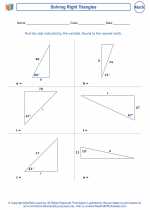The Pythagorean Theorem -> quadratic formula
Quadratic Formula
The quadratic formula is a powerful tool to solve quadratic equations of the form ax^2 + bx + c = 0, where a, b, and c are constants and a ≠ 0.
Formula:
The quadratic formula is given by:
x = (-b ± √(b^2 - 4ac)) / (2a)
Steps to Use the Quadratic Formula:
- Identify the values of a, b, and c in the quadratic equation ax^2 + bx + c = 0.
- Substitute the values of a, b, and c into the quadratic formula.
- Calculate the discriminant (b^2 - 4ac) to determine the nature of the roots:
- If the discriminant is positive, the equation has two distinct real roots.
- If the discriminant is zero, the equation has one real root (a repeated root).
- If the discriminant is negative, the equation has two complex roots.
- Use the quadratic formula to find the values of x by substituting the calculated discriminant into the formula.
Example:
Solve the quadratic equation 2x^2 - 5x + 2 = 0 using the quadratic formula.
First, identify the values of a, b, and c:
a = 2, b = -5, and c = 2
Now, substitute these values into the quadratic formula:
x = (-(-5) ± √((-5)^2 - 4(2)(2))) / (2(2))
Calculate the discriminant:
Discriminant = (-5)^2 - 4(2)(2) = 25 - 16 = 9 (positive discriminant, two distinct real roots)
Substitute the discriminant into the quadratic formula:
x = (5 ± √9) / 4
x = (5 + 3) / 4 or x = (5 - 3) / 4
x = 8 / 4 or x = 2 / 4
x = 2 or x = 0.5
So, the solutions to the equation 2x^2 - 5x + 2 = 0 are x = 2 and x = 0.5
Remember to always check your answers by substituting them back into the original equation to ensure they satisfy the equation.
Study Guide:
When studying the quadratic formula, it's important to understand the following concepts:
- Quadratic equations and their properties
- The discriminant and its role in determining the nature of the roots
- How to substitute values into the quadratic formula
- How to simplify and solve for the roots using the quadratic formula
- Real and complex roots
Practice solving various quadratic equations using the quadratic formula to gain proficiency in applying the formula. Additionally, understanding the geometric interpretation of quadratic equations and their graphs can provide further insight into the solutions obtained using the quadratic formula.
Best of luck with your studies!
.◂Math Worksheets and Study Guides Seventh Grade. The Pythagorean Theorem
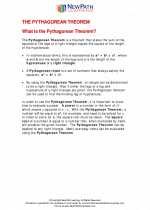
 Study Guide
Study Guide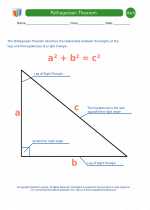
 Worksheet/Answer key
Worksheet/Answer key
 Worksheet/Answer key
Worksheet/Answer key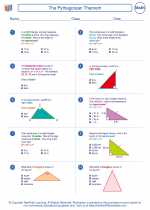
 Worksheet/Answer key
Worksheet/Answer key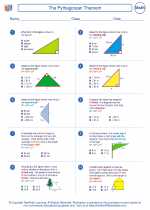
 Worksheet/Answer key
Worksheet/Answer key
 Worksheet/Answer key
Worksheet/Answer key
 Worksheet/Answer key
Worksheet/Answer key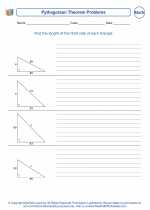
 Worksheet/Answer key
Worksheet/Answer key
 Worksheet/Answer key
Worksheet/Answer key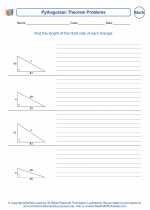
 Worksheet/Answer key
Worksheet/Answer key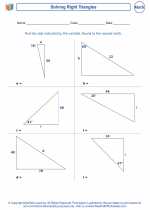
 Worksheet/Answer key
Worksheet/Answer key